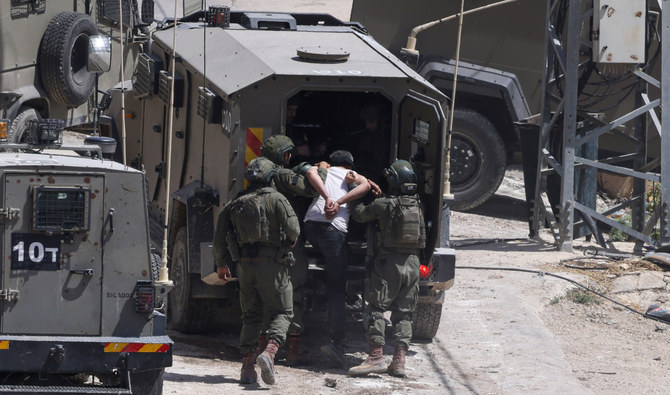GAZA: Palestinians held in Israeli detention since the start of the war in Gaza said they faced systematic ill-treatment by prison authorities whom they accused of deliberately withholding vital medical treatment.
Human rights groups and international organizations have alleged widespread abuse of inmates detained by Israel in raids in the occupied West Bank or during its military advance through in Gaza.
They described abusive and humiliating treatment including holding blindfolded and handcuffed detainees in cramped cages as well as beatings, intimidation and harassment.
“We have left but we call on you to get the rest out,” said former detainee Ataa Shbat, at the Kamal Adwan Hospital in Gaza, where he was taken following his release. He said many detainees believed their families assumed they were dead.
“People are dying. Torture which you cannot imagine unless you taste it (experience it). Suffering which you cannot imagine unless you experience it,” he said.
The Israeli military has said it is investigating allegations of mistreatment of detainees at facilities in Israel but has declined to comment on specific cases. A spokesperson said on Wednesday that details of the investigation would be shared when they were ready.
At least 18 Palestinians have died in Israeli custody since the start of the war, the Palestinian Prisoners Association said on Wednesday, six of whom were from Gaza, including orthopedics surgeon Adnan Al-Bursh.
More than 9,170 Palestinians from the West Bank have been arrested by Israel since Oct. 7, it said, with thousands more “forcibly disappeared” from Gaza. It said their exact number was unknown as Israel has refused to disclose how many Palestinians from Gaza it was holding.
Last week, Israeli state attorneys said authorities had begun transferring prisoners from Sde Teiman, a former military base in the Negev desert, after groups including Association for Civil Rights in Israel demanded the closure of the site.
Widespread reports of mistreatment of detainees in Israeli prisons have added to international pressure on Israel for its conduct of the Gaza war, now in its ninth month. Last month, the US State Department said it was looking into allegations of Israeli abuse of Palestinian detainees.
The main UN relief agency for Palestinians, UNRWA, said in a report from April that prisoners reported ill-treatment throughout their detention. It said this included beatings, being deprived of food, denied access to water or toilets and having their hands and feet bound with plastic ties.



























